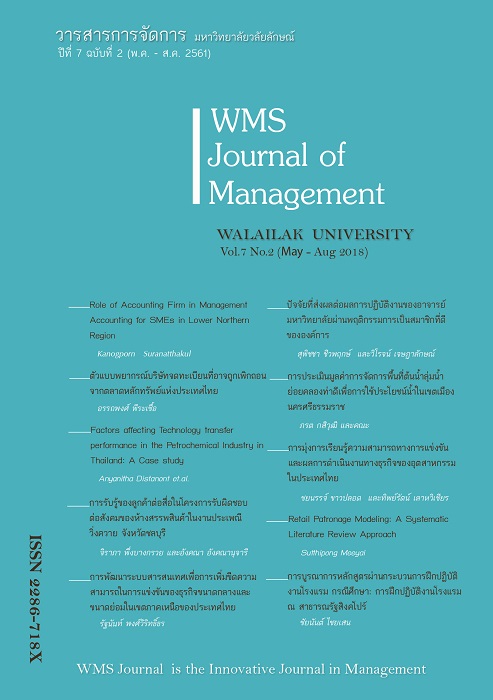The Factors Effecting Job Performance of University Lecturers: The Mediating effect of Organizational Citizenship Behavior
Main Article Content
Abstract
The purpose of this research were to study the influence of perceived of organizational support teacher empowerment and teaching passion on job performance mediating by organizational citizenship behavior. The sample group were 200 full-time governmental university lecturers. The questionnaire was designed to be a research instrument. The research data were collected and analyzed by a Statistical Software for the Social Sciences. Data analysis was conducted by using descriptive statistics and Inferential Statistics. The multiple regression and the Pearson’s Correlation Coefficient were used for hypotheses testing. The mediator variable was analyzed between variables and job performance by using 4 steps of Baron and Kenny.
The result found that teacher empowerment and teaching passion have significantly positive influenced toward organizational citizenship behavior at statistically significant of 0.1. The organizational citizenship behavior have significantly positive influenced toward job performance at statistically significant of 0.1. The organizational citizenship behavior variable is the partial mediation of perceived of organization support and job performance, teacher empowerment and teaching passion at statistically significant of 0.1.
Article Details
References
Bureke, R.J. and Fiksenbaum, L. (2009). Work motivation, Work outcomes and health: passion versus addition. Journal of business ethic. Vol. 84., pp. 257 -263
Chang, R. n. d. (2010). The Passion Plan: Richard Chang Associates. https://www.
thepassionplan. com/.
Cheasakul U. and Varma P. (2016). The influence of passion and empowerment on organizational citizenship behavior of teachers mediated by organizational commitment. The journal of Contaduría y Administración. Vol. 61. No. 3., pp. 422 – 440.
Chughtai, A. A., & Zafar, S. (2006). Antecedents and consequences of organizational
commitment among Pakistani university teachers. Applied H.R.M. Research, 11(1), 39–64.
Cohen, J. (1988). Statistical power analysis for the behavioral sciences (2nd ed.). Hillsdale, NJ: Lawrence Earlbaum Associates
Eisenberger et. al. (1986). Perceived Organizational Support. Journal of Applied Psychology. Vol. 71. No. 3, pp.500 – 507
Faul, F., Erdfelder, E., Lang, A.-G., & Buchner, A. (2007). G*Power 3: A flexible statistical power analysis program for the social, behavioral, and biomedical sciences. Behavior Research Methods, 39, 175-191.
Faul, F., Erdfelder, E., Buchner, A., & Lang, A.-G. (2009). Statistical power analyses using G*Power 3.1: Tests for correlation and regression analyses. Behavior Research Methods, 41, 1149-1160.
Inamori K. (1995). A Passion for Success: Practical, Inspirational, and Spiritual Insight from Japan's Leading Entrepreneur. McGraw-Hill Companies. ISBN13: 9780070317840
Gorgievski, Duijvesteijn and Bakker, Arnold. (2010). Passion for work: Work engagement versus workaholism, Handbook of employee engagement. In S.L. Albrecht (Ed.). pp. 264 – 271
Greenberger S. W. (2013). Applying the Dualistic Model of Passion to Post-Secondary Online Instruction: A Comparative Study. Grand Canyon University, Arizona. 137 - 138
Hair, J.F., Black, W.C., Babin, B.J., & Anderson, R.E. (2010). Multivariate Data Analysis. Seventh Edition. Prentice Hall, Upper Saddle River, New Jersey.
Inamori, K. 1995. A Passion for Success: Practical, Inspiration, and Spiritual Insight from Japan’s Leading Entrepreneur. New York: McGraw-Hill Education.
Jahangir, N. Akbar, M.M. Haq, M. (2004). Organization Citizenship Behavior: Its Nature and Antecedents. BRAC University Journal, 1, 75 – 85.
Kinlaw, JH. (1995). The practice of empowerment. Hampshire, England: Gower.
Kirkman, B. L., Rosen, B., Tesluk, P. E., & Gibson, C. B. (2004). The impact of team empowerment on virtual team performance: The moderating role of face-to-face interaction. Academy of Management Journal, Vol. 47,pp. 175–192
Laschinger HK, Finegan J, Shamian, J, Wilk P. (2001). Impact of structural and psychological empowerment on job strain in nursing work settings: expanding Kanter's model. Journal of Nursing Administration. Vol. 31, pp. 260-72.
Murphy K.R. & Cleveland J.N. (1991). Performance Appraisal: An Organizational Perspective. Boston,MA : Allyn & Bacon
Organ, D. W. (1988). Organizational Citizenship Behavior: The Good Soldier Syndrome. The Academy of Management Review. Vol. 14, No. 2, pp. 294-297.
Osterlind, S. J. (2002). Constructing test items: Multiple-choice, constructed response, performance, and other formats. New York: Kluwer Academic Publishers.
Rhoades, Linda; Eisenberger, Robert. (2002).
Perceived organizational support: A review of the literature. Journal of Applied Psychology, Vol 87(4), Aug 2002, 698-714. https://dx.doi.org/10.1037 /0021-9010.87.4.698
Short, P. M., & Rinehart, J. S. (1992). School Participant Empowerment Scale: Assessment of Level Of Empowerment Within The School Environment. Journal of Educational and Psychological Measurement, Vol. 52, pp. 951-960
Wilson S. and Cooligan M.J. (1996). How high and self-empowered teachers work with colleagues and school principals. The Journal of Educational Thought, Vol. 30, pp. 601–617
Zigarmi, D.; Nimon, K.; Houson, D.; Witt, D. and Diehl, J. 2009. From Engagement to Work Passion. Retrieved August 20, 2009 from https://www.kenblanchard.com
/img/pub/Blanchard_From_Engagement_to_Work_Passion.pdf
Donthawe Saiwijit, Montree Piriyakul and Prayong Meesue (2012). The Influence of Causal Factors on the Performance of Personnel at TOT Public Company Limited. Journal of Modern Management. Faculty of Management Science. Lampang Rajabhat University. Vol. 5 No. 2 July – December 2012.
Rattanapat Suwansit and Viroj Jadesadalug. (2015). Perceived Organizational Support in which Affects Performance Effectiveness through Personnel Core Competency of Social Security Office. Veridian E-Journal, Slipakorn Universit. Vol. 8 No. 2 May – August 2015.
Siriwan Serirat et. Al. (1999). Organization Behavior. Bangkok , Teerafilm and Sci – Tech.
Sukrit Anyabutra, Thitiporn Pichayakul and Boonrueng Sriharun (2012). A Study of Environment of the Royal Thai Air Force Academies Preparatory School. Journal of Graduates Studies. Valaiya Alongkorn Rajabhat University. Vol. 6 No. 1. January – April 2012.


